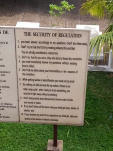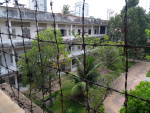The Killing Fields
Could we do this full time? That is travel from developing country to developing country, making the most of the cheap cost of living? I reckon £80 a day would easily do you, especially if you stayed in some places for extended periods (as travel, even some coach and rail travel, eats into your daily allowance). And for that money you could get B&B and eat out, plus a couple of beers. It might be the ultimate life of Riley? Imagine never having to cook or wash up?
[image error]
C and I had a breakfast discussion about this and, whilst we agreed we were having a royal time, there were two red flags. First, the heat. We are both good in the heat, but if there were no escape in sight, I think it would drive us a bit mad. I did six months in Sierra Leone without an air-conditioned bedroom, and whilst I worked through that it wasn’t a long term solution. The second red flag, waving madly for me, would be living as a rich white man abroad. I struggle with the deference, the smiles and bowed heads, even if there’s a different reaction when we’re not in view. I can understand how some people might enjoy that level of service, but for me it grates. What about working over here for an NGO?, C asks. Not a bad idea, but then the heat becomes a factor … and, in any case, I do want to write.
So, no. Probably not. Any extended time away will be in Doris. Like the 8-month extended tour of Italy and Greece we did 5 years ago (was it really that long?). Yes, that’s it.
The coach journey with Giant Ibis coach company to Phnom Penh ($15 each) was comfortable, included free water and a croissant, left on time and reaffirmed to us that coach and rail travel is so much better than flying … if you have the time. And our driver did not knock over a single motorcyclist.
[image error]
Which is a surprise when you consider how many there are (motorcyclists, not coaches) and how ruthlessly our driver drove. Motorcycles and tut-tuts are everywhere. Everyone has one, including most children. They are used to transport four people at the same time, adapted to carry loads you’d need a skip for back home, and many are made into travelling shops. I love them. And, thankfully, we have yet to see any accidents, although I understand that motorcycle usage moves to another level in Vietnam. Looking forward to that.
Phnom Penh is super crazy. Built on the confluence of the mighty Mekong (which rises in the Himalayas, don’t you know) and a lesser river, and remembering that the city was emptied by the Khmer Rouge in the 70s, it is a city alive with endeavour. They’re building everywhere and some of it looks both modern and safe. There’s money here, mixed brashly amongst the poverty, and high-rises are on the up, so to speak. The streets are alive with vendors, with cars and motorcycles traveling in all directions, not all them complementary. And yet it seems to work. There’s no angst here, just life. A miasma of it. And it’s fab.
Our homestay is … interesting, down a backstreet of a backstreet, but it’s clean, comfortable, has WiFi and air-conditioning. The owner dropped us off at a restaurant-cum-garage where we were offered beef or soup. We had both, and then brought some crisps on the way home. And none of us got injured crossing the roads. Result.
[image error]
And then down to earth.
On Sunday we visited S21, the genocide museum, after which we went to one of the killing fields. We’ve done Auschwitz/Birkenau and Bergen/Belsen and I’ve written about the former before. Here, like then, it’s very difficult to put into words what you feel. But I’m going to try.
Like the original Auschwitz camp, which was cavalry barracks before it became the test-case centre for mass-murder, S21 was not purpose built. It was originally a school; four, three-story concrete blocks around two courtyards. The museum had tried to leave it as it was, with the wretched, tortured and then often murdered inmates replaced by horrific photographs. The make-shift cells (some wooden, some brick) are as they were. Some of the barbed wire, put there to prevent prisoners commuting suicide over the balconies, is also in place. C took an audio-guide, whilst I wandered and read the many signs and notes. For me that was enough. The stained tiles told the story. The grainy photos added depth.




I closed the door of one of the 2×6 foot wooden cells – whilst I was in it – and tried to imagine the lashings with electrical cable, the beatings with sticks – swapping guards when one of them got tired, being hung from tied writsts behind my back knowing that to cry out was against the rules and that more beatings would come if I did.
Of course I couldn’t. There was no way to transport yourself to that hell. But in fairness to the museum, the environment enabled me to give it my best shot. Being left as it was with little elaboration makes it more poignant than if there had been electronic displays … and a coffee shop.
It was something else, and a must if you come to SE Asia.
And do you mind me making a contemporary point? Dictatorships are driven by men who crave authority and power. Their currency is fear. They’re sustained by the desires of those in power, not be the needs of those they control. As such they are self-perpetuating, that is until the grip is broken. And, once dictatorships have a taste of unopposed rule, those in power will resort to anything to hold on. Free speech, the rule of law, human rights … they go in time.
Liberal democracy is not dead at dictator Putin has recently argued. It can’t be. It mustn’t be. As I understand it, His Orangeness had hijacked the 4th of July celebrations in Washington. Apparently there wil now be VIP enclosures, with tickets etc. His daughter, not his Secretary of State, was at his side at the recent G20 summit. These are small steps by a man who would be king. Over here Brexit breaks us from a group of nations designed to be held together for the common good – among other things, to prevent a replay of our continent’s very recent ‘horrible history’. We only have to look to the very recent mass-killings in Bosnia to know what we’re capable of.
No, liberal democracy is not dead. It can’t be. And, if it is, our ancestors’ ancestors will be visiting camps such as these where we might have been guests.
Depressing, isn’t it?
Sorry. More positive news next time.



